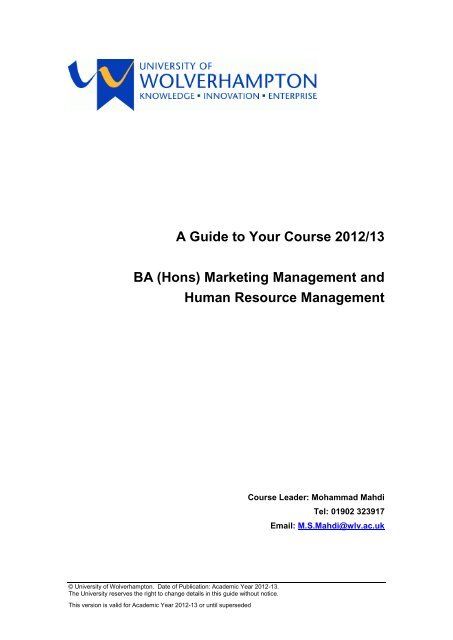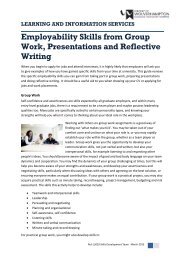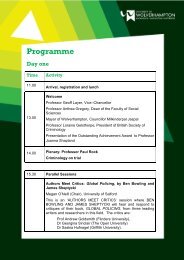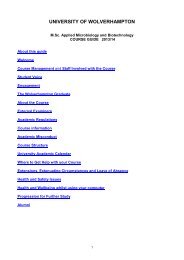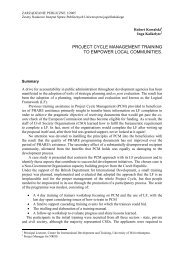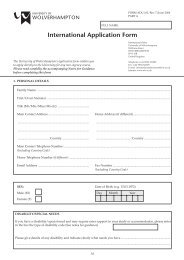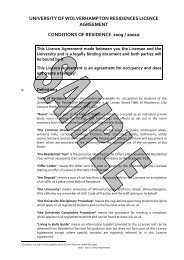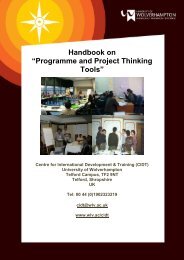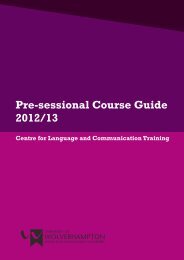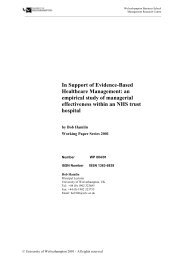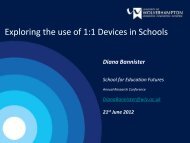(Hons) Marketing Management and Human Resource Management
(Hons) Marketing Management and Human Resource Management
(Hons) Marketing Management and Human Resource Management
Create successful ePaper yourself
Turn your PDF publications into a flip-book with our unique Google optimized e-Paper software.
A Guide to Your Course 2012/13<br />
BA (<strong>Hons</strong>) <strong>Marketing</strong> <strong>Management</strong> <strong>and</strong><br />
<strong>Human</strong> <strong>Resource</strong> <strong>Management</strong><br />
Course Leader: Mohammad Mahdi<br />
Tel: 01902 323917<br />
Email: M.S.Mahdi@wlv.ac.uk<br />
© University of Wolverhampton. Date of Publication: Academic Year 2012-13.<br />
The University reserves the right to change details in this guide without notice.<br />
This version is valid for Academic Year 2012-13 or until superseded
Table of Content<br />
About this guide ...................................................................................................... 1<br />
Welcome .................................................................................................................. 2<br />
Attendance .............................................................................................................. 3<br />
The Wolverhampton Graduate ............................................................................... 3<br />
Digitally Literate ..................................................................................................................... 3<br />
Knowledgeable <strong>and</strong> Enterprising ........................................................................................... 3<br />
Global Citizens ....................................................................................................................... 3<br />
About the Course .................................................................................................... 4<br />
The Educational Aims ............................................................................................................ 4<br />
Learning Outcomes ............................................................................................................... 4<br />
Learning Activities.................................................................................................................. 5<br />
Employment <strong>and</strong> Further Training Opportunities .................................................................. 5<br />
Distinctive Features of the Course ........................................................................................ 6<br />
Academic Regulations ............................................................................................ 6<br />
Course Information ................................................................................................. 6<br />
Course Structure BA (<strong>Hons</strong>) <strong>Marketing</strong> <strong>and</strong> <strong>Human</strong> <strong>Resource</strong> <strong>Management</strong> ..... 7<br />
Module Information ................................................................................................. 8<br />
Level 4 ................................................................................................................................... 8<br />
Level 5 ................................................................................................................................. 10<br />
Level 6 ................................................................................................................................. 11<br />
Support for Learning - Learning <strong>and</strong> Information Services (LIS)....................... 13<br />
Feedback ............................................................................................................... 14<br />
Indicative Assessment Matrix. ............................................................................. 15<br />
Undergraduate Academic Calendar 2012/13 ....................................................... 17<br />
Course <strong>Management</strong> & Staff involved with the Programme............................... 18<br />
What is a Student Rep ........................................................................................ 19<br />
Where to get help with your course ..................................................................... 20<br />
Frequently Asked Questions (FAQs) ................................................................... 21<br />
How to Solve Your Problems ............................................................................... 22<br />
Employability & Your Personal Development Portfolio (PDP) ........................... 23<br />
Career Opportunities <strong>and</strong> Progression for Further Study .................................. 25<br />
UWBS Promisefor Students ................................................................................. 25<br />
Policy on Tackling Academic Misconduct .......................................................... 26
About this guide<br />
This Course Guide will help you plan your course. It tells you which modules you must study<br />
<strong>and</strong> pass <strong>and</strong> lists the optional ones which contribute to your award. The Guide also offers<br />
you brief descriptions of each module, including general information about assessment<br />
tasks, <strong>and</strong> an overview of how the Course can be used for future career choices.<br />
You should read this Course Guide in conjunction with the Undergraduate Student Guide;<br />
the University’s Policies <strong>and</strong> Regulations. These documents should provide you with all the<br />
basic information that we think you will need for your period of study here.<br />
You are encouraged to read this Guide through now. It will be a considerable advantage to<br />
you to be familiar from the outset with the various aspects of your studies that are described.<br />
It may be that the relevance of some of the sections will not be immediately obvious. Keep it<br />
somewhere accessible, so that you can refer to it as needed. The answers to many of the<br />
questions that you will want to ask are contained in it.<br />
Obviously even in a document like this we have not covered every query <strong>and</strong> problem that<br />
you might have about the course. If you find that there is something you need to know,<br />
please subscribe to: UWBS Undergraduate Administration 2012 – 13. You can also consult<br />
the University’s Student Services Gateway as appropriate. We are pleased to hear your<br />
views <strong>and</strong> welcome suggestions for ways of improving the operation of the course.<br />
Please enter the contact details for your<br />
Personal Tutor for your future reference:<br />
---------------------------------------<br />
(The name of your Personal Tutor will be<br />
given to you at the beginning of the<br />
course <strong>and</strong> can be checked via e:Vision)<br />
Your local Student Office<br />
(Here 2 Help) is:<br />
MI Building City Campus South<br />
Your School Office is:<br />
MN018 City Campus North<br />
Please note that in order to develop <strong>and</strong> improve the Course, it may be necessary on<br />
occasions to amend or revise the details given in this Course Guide.<br />
1
Welcome<br />
On behalf of the Course <strong>Management</strong> Team I should like to extend to you a very warm<br />
welcome <strong>and</strong> we would like to take this opportunity to wish you every success in your<br />
studies at the University of Wolverhampton, <strong>and</strong> trust that your time at the University of<br />
Wolverhampton will prove to be enjoyable, stimulating <strong>and</strong> rewarding.<br />
BA (<strong>Hons</strong>) <strong>Marketing</strong> <strong>and</strong> <strong>Human</strong> <strong>Resource</strong> <strong>Management</strong> course (Joint Degree) is one of<br />
many run by the University of Wolverhampton Business School which has itself established<br />
an excellent reputation for the quality of its courses, for an innovative approach to teaching<br />
<strong>and</strong> learning, <strong>and</strong> for the friendliness of its staff.<br />
We believe it is important that you are encouraged to make your own contribution to the<br />
effective operation <strong>and</strong> development of your chosen course. We are, therefore, keen to hear<br />
your views <strong>and</strong> would welcome any suggestions that you may have about ways of improving<br />
any aspect of your course <strong>and</strong>/or the student experience here at the University. In practice,<br />
you will have the opportunity to do this through our student voice processes.<br />
Remember that the outcome of your studies could affect the whole of your future career <strong>and</strong><br />
therefore study should certainly be your first priority. In resolving to work hard however, do<br />
not forget to have time for recreation <strong>and</strong> social activities. Do take full advantage of the<br />
University facilities at your disposal.<br />
Mohammad Mahdi, Course Leader:<br />
2
Attendance<br />
The University recognises that you have made a significant investment in both time <strong>and</strong><br />
money in choosing to study for an undergraduate degree. Staff are committed to helping<br />
you fulfil your potential. Your attendance at, <strong>and</strong> participation, in classes is a key factor in<br />
ensuring that you do so.<br />
Attendance will help you to:<br />
Underst<strong>and</strong> the subject area you are studying<br />
Acquire <strong>and</strong> develop the skills <strong>and</strong> knowledge needed to ensure success<br />
Prepare for <strong>and</strong> undertake assessments<br />
Learn from <strong>and</strong> with your fellow students<br />
Receive feedback from teaching<br />
Participate in practical <strong>and</strong> group work<br />
Develop your communication skills<br />
If you are unable to attend a class please let your tutor know that you are unable to do so.<br />
He/she will then be able to give you advice on what was covered in class, <strong>and</strong> what you<br />
need to do to catch up. Please do remember how important attendance is to your success.<br />
The University considers this to be so important that it reserves the right to review the<br />
position of students who fail to attend.<br />
The Wolverhampton Graduate<br />
By the end of your course, the university expects you to be a Wolverhampton Graduate who<br />
is knowledgeable <strong>and</strong> enterprising, digitally literate <strong>and</strong> a global citizen.<br />
Digitally Literate<br />
Our graduates will be confident users of advanced technologies; they will lead others,<br />
challenging convention by exploiting the rich sources of connectivity digital working allows.<br />
Knowledgeable <strong>and</strong> Enterprising<br />
Our graduates will know how to critique, analyse <strong>and</strong> then apply knowledge they acquire in<br />
an enterprising way.<br />
Global Citizens<br />
Our graduates will bring informed underst<strong>and</strong>ings of their place <strong>and</strong> ethical responsibilities in<br />
the world.<br />
Further information can be found on the University student webpage for Graduate Attributes.<br />
3
About the Course<br />
The Educational Aims<br />
The BA (<strong>Hons</strong>) <strong>Marketing</strong> <strong>and</strong> <strong>Human</strong> <strong>Resource</strong> <strong>Management</strong> course aims to provide<br />
students with knowledge <strong>and</strong> underst<strong>and</strong>ing of marketing <strong>and</strong> human resourcing theories<br />
<strong>and</strong> their strategic applications to organisations operating within a highly digitised <strong>and</strong><br />
changing global environment. The course will provide an interdisciplinary approach as it<br />
draws on a range of academic disciplines, such as psychology <strong>and</strong> sociology, <strong>and</strong> will<br />
include the study of organisations, markets, building relationships with stakeholders,<br />
advertising, marketing planning, selling techniques, leadership, employee relations,<br />
employee development, <strong>and</strong> ethics. Students who want to embark on an in-depth study of<br />
<strong>Marketing</strong> <strong>and</strong> HR will gain underst<strong>and</strong>ing of a range of management <strong>and</strong> business practices<br />
<strong>and</strong> the ability to apply them effectively in an innovative manner. Additionally, the course will<br />
assist students to develop digital literacy skills through the use of applications <strong>and</strong> software<br />
used by contemporary organisations. The Chartered Institute of <strong>Marketing</strong> <strong>and</strong> the Chartered<br />
Institute of Personnel <strong>and</strong> Development lead body st<strong>and</strong>ards are closely aligned with the<br />
design of the course.<br />
The course will help students to develop informed perspectives of Global Citizenship <strong>and</strong><br />
through a range of topical areas students will develop their own underst<strong>and</strong>ings of collective<br />
responsibilities as global citizens within their local, national <strong>and</strong> international communities.<br />
The BA (<strong>Hons</strong>) <strong>Marketing</strong> <strong>and</strong> <strong>Human</strong> <strong>Resource</strong> <strong>Management</strong> course provides an<br />
opportunity for students to pursue a one-year work placement in employment, in the UK or<br />
abroad. A dedicated work placement officer will make students aware of possible workplacement<br />
opportunities <strong>and</strong> help student prepare their CVs.<br />
Learning Outcomes<br />
By the end of the course the student will be able to:<br />
1. Develop critical thinking through the application of concepts <strong>and</strong> principles of<br />
marketing <strong>and</strong> human resourcing underpinned by business theories to a wide range<br />
of organisations <strong>and</strong> situations.<br />
2. Assess the impact of changing internal <strong>and</strong> external environmental forces on<br />
organisations’ marketing activities <strong>and</strong> people management practices.<br />
3. Formulate, implement <strong>and</strong> evaluate <strong>Marketing</strong> <strong>and</strong> HRM plans, models, relationships,<br />
tasks <strong>and</strong> roles within complex <strong>and</strong> dynamic global business environments.<br />
4. Apply relevant tools <strong>and</strong> techniques for analysing <strong>and</strong> interpreting data <strong>and</strong><br />
information using contemporary <strong>and</strong> appropriate technologies aimed to increase<br />
awareness of digital literacy <strong>and</strong> interpersonal skills.<br />
5. Demonstrate a range of marketing <strong>and</strong> people management skills which will be<br />
attractive to employers, both inside <strong>and</strong> outside the human resourcing profession at a<br />
local, national <strong>and</strong> international level.<br />
6. Debate the ethical <strong>and</strong> moral dimensions of marketing <strong>and</strong> human resourcing<br />
management practices.<br />
4
Learning Activities<br />
Knowledge <strong>and</strong> Underst<strong>and</strong>ing<br />
<br />
<br />
<br />
<br />
<br />
<br />
<br />
Reading – both core <strong>and</strong> supplementary reading from books, journals <strong>and</strong> electronic<br />
sources <strong>and</strong> keeping abreast of current affairs <strong>and</strong> business news.<br />
Case Study Analysis – looking at the application of theory <strong>and</strong> practice, to identify<br />
problems <strong>and</strong> recommend solutions.<br />
Group Discussions – on identified themes to draw out <strong>and</strong> share personal<br />
experiences <strong>and</strong> learning amongst the wider group through various digitised forums.<br />
Student Presentations/Student led Seminars.<br />
Problem-based learning approaches.<br />
Lectures <strong>and</strong> Workshops.<br />
Group <strong>and</strong> Individual Tutorials<br />
Digital Literacy<br />
Teaching <strong>and</strong> learning materials of all modules will be provided electronically in the<br />
institutional VLE. Students will be able to take part in collaborative learning through<br />
WOLF Forums <strong>and</strong> use of the WOLF Cafés <strong>and</strong> they will use electronic forums as part<br />
learning activities.<br />
Knowledge <strong>and</strong> Enterprise<br />
All modules have learning activities designed to develop students’ abilities to critique,<br />
analyse <strong>and</strong> apply knowledge they acquire in an enterprising way. Modules will<br />
constantly nurture the student’s intellectual curiosity <strong>and</strong> encourage sharing new<br />
knowledge.<br />
Global Citizenship<br />
The diversity of topics <strong>and</strong> subjects covered by modules will develop students’<br />
underst<strong>and</strong>ings of ethical <strong>and</strong> social responsibilities in the world. The students will have<br />
personal <strong>and</strong> professional values that help them to lead, <strong>and</strong> take a substantial role in<br />
their local, national <strong>and</strong> global communities.<br />
Employment <strong>and</strong> Further Training Opportunities<br />
Students who successfully complete the course are expected to enhance their job<br />
prospects <strong>and</strong> strengthen their employment opportunities. The course is designed to<br />
prepare students for a range of marketing <strong>and</strong> human resourcing related careers – HR<br />
management/Personnel, HR Advisor, product, markets, account management, sales,<br />
recruitment, marketing research, advertising, PR, retailing, training <strong>and</strong> development<br />
within consumer, business to business, manufacturing <strong>and</strong> service sectors. The wide<br />
range of relevant skills gained by the end of the course would provide students with<br />
opportunities to progress into various management positions in both the private <strong>and</strong><br />
public sector.<br />
As an accredited CIM centre, the course has been designed to obtain maximum<br />
exemptions from the Chartered Institute of <strong>Marketing</strong> (CIM) qualifications. On successful<br />
completion of the BA (<strong>Hons</strong>) <strong>Marketing</strong> <strong>and</strong> <strong>Human</strong> <strong>Resource</strong> <strong>Management</strong> course<br />
students will be able to get exemption from the CIM Professional Certificate in <strong>Marketing</strong><br />
<strong>and</strong> subject to fulfilling certain requirement will further be able to get exemption from the<br />
5
CIM Professional Certificate in <strong>Marketing</strong> <strong>and</strong> the CIM Professional Diploma in <strong>Marketing</strong><br />
<strong>and</strong> with the relevant work experience can progress onto study the CIM Chartered<br />
Professional Postgraduate Diploma in <strong>Marketing</strong> or study at Master’s level one of our<br />
masters programmes.<br />
The Chartered Institute of Personnel <strong>and</strong> Development (CIPD) are currently revising the<br />
HR Professional St<strong>and</strong>ards. It is likely that the modules contained in this degree will<br />
cover some of the Intermediate level st<strong>and</strong>ards leading to Associate Membership.<br />
<br />
<br />
<br />
<br />
<br />
<br />
<br />
Distinctive Features of the Course<br />
Strong team of dedicated professional <strong>Marketing</strong> <strong>and</strong> HR lecturers who have many years<br />
of teaching experience, research publications <strong>and</strong> industrial experience in the subject.<br />
The course places a strong emphasis on employability skills by building skills <strong>and</strong><br />
confidence employers require e.g. IT skills, project management skills.<br />
Opportunity to gain valuable work experience through the s<strong>and</strong>wich route. Students will<br />
have the support of our dedicated employment staff to secure a placement.<br />
Blended learning approach that makes full use of face to face sessions supported by<br />
online technologies.<br />
Opportunity to join one of our Knowledge Transfer Partnership (KTP) programmes,<br />
which the University of Wolverhampton is a leading provider of KTPs in the West<br />
Midl<strong>and</strong>s.<br />
Recognition of the course by the CIPD <strong>and</strong> an opportunity to exit with CIPD professional<br />
body membership.<br />
The course has been designed to obtain maximum exemptions from the Chartered<br />
Institute of <strong>Marketing</strong> (CIM) qualifications.<br />
Academic Regulations<br />
This course adheres to the University’s academic regulations. A full version of these<br />
regulations can be found on the University web page for Policies <strong>and</strong> Regulations. These<br />
regulations govern your course <strong>and</strong> will be binding on you. It is, therefore important that you<br />
read <strong>and</strong> become familiar with them.<br />
Course Information<br />
Students will study:<br />
St<strong>and</strong>ard Full-time: modules worth 120 credits each academic year, taught over two<br />
semesters.<br />
Part-time: normally modules worth no more than 80 credits each academic year.<br />
6
Course Structure BA (<strong>Hons</strong>) <strong>Marketing</strong> <strong>and</strong> <strong>Human</strong> <strong>Resource</strong><br />
<strong>Management</strong><br />
Level 4 (1)<br />
Semester 1 Semester 2<br />
C 4BU006 Learning For Business Success (Year Long) 20<br />
C 4MK002 <strong>Marketing</strong> Principles (Year Long) 20<br />
C<br />
4HR002 Introduction to People At<br />
Work<br />
20 C 4HR003 People, Work & Society<br />
20<br />
C 4MK004 <strong>Marketing</strong> in Action 20 C 4MK003 <strong>Marketing</strong> Research 20<br />
Level 5 (2)<br />
Semester 1 Semester 2<br />
C 5MK005 Entrepreneurial <strong>Marketing</strong> (Year Long) 20<br />
C 5HR004 Managing the Employment Cycle (Year Long) 20<br />
C 5MK006 <strong>Marketing</strong> Planning 20 C<br />
C<br />
5HR002 Leading <strong>and</strong> Managing in<br />
Organisations<br />
20 C<br />
5MK003 Digital <strong>and</strong> <strong>Marketing</strong><br />
Communications<br />
5HR003 HR Issues in a European<br />
Context<br />
20<br />
20<br />
5BU005 Supervised Work Placement – optional module<br />
Level 6 (3)<br />
Semester 1 Semester 2<br />
C 6BU001 Researching Business <strong>and</strong> <strong>Management</strong> Issues (Year Long) 20<br />
C 6MK002 <strong>Marketing</strong> Strategy (Year Long) 20<br />
C<br />
6MK003 Consumer Behaviour <strong>and</strong><br />
Relationships<br />
20 C<br />
6MK005 Personal Selling <strong>and</strong><br />
Sales <strong>Management</strong><br />
20<br />
C<br />
6HR003 Strategies for People<br />
<strong>Management</strong><br />
20 C<br />
6HR001 Contemporary Issues in<br />
Employee Relations<br />
20<br />
Please note: C = Core Module, O = Option Module<br />
7
Module Information<br />
The following descriptions are intended to give a brief flavour of the core modules you will be<br />
studying during your course; you can find more detailed information in the module guides.<br />
Your course is divided into three levels of study;<br />
<br />
<br />
<br />
Level 4 is the introductory level which will give an insight into the subject <strong>and</strong> aims to<br />
equip students with the basic building blocks required for degree level study <strong>and</strong> to<br />
facilitate the acquisition of knowledge <strong>and</strong> skills within a structured setting.<br />
Level 5 is developmental building upon the framework laid in the introductory year to<br />
broaden the students’ subject knowledge <strong>and</strong> skill set by the application of theoretical<br />
modules <strong>and</strong> conceptual frameworks to review consolidate <strong>and</strong> extend<br />
underst<strong>and</strong>ing.<br />
Level 6 is advanced concentrating on critical evaluation of ideas, models, theories<br />
<strong>and</strong> arguments in complex <strong>and</strong> undefined situations.<br />
The learning, teaching <strong>and</strong> assessment approaches reflect this progression from the<br />
analysis of structured situations with an emphasis on tutor guided learning at level 4 to<br />
greater independent learning, research <strong>and</strong> evaluation of unstructured business problems<br />
<strong>and</strong> cases at level 6.<br />
Level 4<br />
4BU006<br />
The aim of this module is to introduce students to the concept of learning, personal<br />
development planning <strong>and</strong> how through reflection they can improve on a range of study <strong>and</strong><br />
employability skills to develop the confidence <strong>and</strong> positive attitude required for academic <strong>and</strong><br />
career success in a business context. It addresses the need for students to receive<br />
structured guidance on how to become more self-aware, how they might learn <strong>and</strong> develop<br />
themselves to improve their personal performance <strong>and</strong> how to build on their strengths <strong>and</strong><br />
development needs to enhance their employability.<br />
4HR002<br />
The management of employees is often understood only through the lens of the<br />
organisation, yet employees arrive in the workplace with their own set of goals, hopes <strong>and</strong><br />
ambitions. One of the biggest challenges for managers <strong>and</strong> organisations is to underst<strong>and</strong><br />
the complex range of employee issues they might need to take account of in order to<br />
balance the needs of workers with organisational expectations <strong>and</strong> dem<strong>and</strong>s. The aim of this<br />
module is to discuss the nature of employee behaviour in the workplace, <strong>and</strong> to consider<br />
particularly the aims, expectations <strong>and</strong> ambitions employees might bring to organisations,<br />
<strong>and</strong> the choices available to organisations <strong>and</strong> managers in managing them. The module<br />
seeks to consider the view “from the bottom up”, i.e. from the view of the employee, as well<br />
as from the position of the manager. It will consider issues such as job satisfaction,<br />
motivation <strong>and</strong> engagement, as well as fairness, wellbeing, <strong>and</strong> worker voice. It will also<br />
provide students with the opportunity to reflect on their own attitudes, ambitions <strong>and</strong><br />
motivation to work. This module will be useful for all students studying a business <strong>and</strong><br />
management degree of any discipline, as well as for those interested in the behaviour of<br />
employees <strong>and</strong> the management of people in the workplace. It also provides a sound<br />
platform for students wishing to study further HR modules.<br />
8
4HR003<br />
The module brings to students’ awareness the transforming impact of our fast changing<br />
society <strong>and</strong> the world of work. It provides them with an underst<strong>and</strong>ing of a range of<br />
sociological themes <strong>and</strong> perspectives e.g. Marxism, Feminism, Post-modernism, which<br />
continue to shape our life <strong>and</strong> the workplace. It aims: • To develop awareness <strong>and</strong><br />
appreciation of issues such as social inequality <strong>and</strong> stratification, feminist <strong>and</strong> gender issues,<br />
race <strong>and</strong> ethnicity - managing diversity, <strong>and</strong> how they impact on the experience of work. • To<br />
provide insights into the meaning of work, conflict at work, attitudes towards work, skills &<br />
deskilling, <strong>and</strong> the changing nature of the globalised workplace, e.g. quest for flexibility<br />
4MK002<br />
Provide frameworks to underst<strong>and</strong> the importance of marketing within the business<br />
environment.<br />
Demonstrate an underst<strong>and</strong>ing of the marketing tools an organisation will need to use in<br />
order to compete in today’s dynamic marketplace.<br />
4MK003<br />
The aim of this module is to introduce students to marketing research as a process<br />
concerned with the systematic collection of evidence, analysis of data <strong>and</strong> evaluation of<br />
information relating to marketing questions which organisations of all kinds need to address.<br />
The module explores different research methodologies <strong>and</strong> provides opportunities for h<strong>and</strong>son<br />
experience in collecting a range of market <strong>and</strong> customer information. It develops<br />
underst<strong>and</strong>ing of how marketing information supports marketing decisions within<br />
organizations, insight into the role of databases in information management in contributing to<br />
the overall marketing process. The learning activities <strong>and</strong> assessment tasks offered<br />
throughout the module are designed to contribute to the development of each individual’s<br />
practical business <strong>and</strong> employability skills.<br />
4MK004<br />
The aim of this module is to recognise the nature <strong>and</strong> scope of an organisation’s diverse<br />
range of Customers <strong>and</strong> Stakeholders <strong>and</strong> their relative importance to the marketing<br />
process. <strong>Management</strong> of expectations helps to develop marketing relationships effectively,<br />
in terms of utilising a marketing mix that influences <strong>and</strong> satisfies stakeholder needs in line<br />
with the organisation’s business <strong>and</strong> marketing objectives.<br />
There is a particular emphasis on developing approaches to communicating effectively with<br />
customers <strong>and</strong> stakeholders alike based upon their relative importance <strong>and</strong> interest in the<br />
organisation, coordinated for maximum influence <strong>and</strong> effect.<br />
On completion, students should be able to demonstrate a thorough underst<strong>and</strong>ing of the<br />
importance <strong>and</strong> status of different stakeholder groups <strong>and</strong> the priorities for managing an<br />
effective marketing <strong>and</strong> communications mix to aid relationship development.<br />
9
Level 5<br />
5HR002<br />
The aims of the module are four fold:<br />
<br />
<br />
<br />
<br />
Within a theoretical framework to develop an underst<strong>and</strong>ing of <strong>and</strong> can explain the<br />
need to manage self before embarking on the management of others, <strong>and</strong> how, to<br />
identify <strong>and</strong> select tools to better manage self.<br />
To gain an appreciation <strong>and</strong> underst<strong>and</strong>ing of theoretical constructs of managing <strong>and</strong><br />
leading others. To explore, to explain <strong>and</strong> select which approaches should be used in<br />
the management of others.<br />
To assess the impact of how individual perceptions, beliefs <strong>and</strong> also factors outside<br />
the managers control can impact upon the management of others <strong>and</strong> is able to<br />
explain how others respond to being managed or led.<br />
Student will be able to identify the fundamentals of change in a business environment<br />
<strong>and</strong> apply tools of change management to case studies<br />
5HR003<br />
This module aims to explore contemporary developments in the field of HR within the<br />
context of changes in the European legislative, political, social, economic <strong>and</strong> cultural<br />
contexts. Many businesses are faced with resourcing their organisations against the<br />
backdrop of trading within a European context. Therefore an underst<strong>and</strong>ing of the role of EU<br />
institutions <strong>and</strong> of the dynamics of European human resourcing issues become integral to<br />
current business practice <strong>and</strong> strategic awareness. The module will provide an overview of<br />
the EU, its history, structure, institutions <strong>and</strong> functions before debating its impact on the<br />
development <strong>and</strong> embedding of HRM as a set of ideas <strong>and</strong> practices for people<br />
management. The aim of the module is to engage students with the very important EU<br />
setting within which human resourcing now takes place. The future of the European Union<br />
will be considered throughout the module<br />
5HR004<br />
The module seeks to discuss aspects of the Employment Cycle within an organisational<br />
context .Particular practical consideration is given to the people management issues which<br />
all line managers, at all levels, will face within the role of <strong>Human</strong> Resourcing within an<br />
organisation, in effective change management. The module considers the broad practical<br />
application of HR with reference to <strong>and</strong> examples of external factors as drivers of an<br />
organisation’s reaction to changing environments<br />
5MK003<br />
This module will introduce the tools <strong>and</strong> techniques used by marketers when they are<br />
communicating with their customers <strong>and</strong> other stakeholders. It will highlight the growing<br />
importance of the use of digitally based methods in marketing such as web or text<br />
messaging <strong>and</strong> how these can be successfully implemented. In addition this module will also<br />
consider the link to more traditional methods of marketing communications i.e. advertising<br />
<strong>and</strong> direct mail <strong>and</strong> ensure that these are incorporated in to an overall integrated marketing<br />
communications plan <strong>and</strong> campaign<br />
10
5MK005<br />
Entrepreneurial <strong>Marketing</strong> focuses on the development of effective marketing for Small &<br />
Medium Sized Businesses, <strong>and</strong> Start-Ups. Typically these organisations are resource critical<br />
<strong>and</strong> have limited capabilities to engage in competitive marketplaces. This module addresses<br />
the critical marketing success factors for “doing it better” <strong>and</strong> achieving business success. It<br />
also highlights the role of the entrepreneur in delivering innovation <strong>and</strong> stakeholder value<br />
through marketing.<br />
Students will have an opportunity to engage with case studies, simulation exercises <strong>and</strong><br />
activities such as the elevator pitch. The fundamental aim is to actively engage <strong>and</strong> enthuse<br />
students about the role <strong>and</strong> development of entrepreneurs in contemporary small business<br />
related topics that reflect real life experiences (using contemporary examples such as the<br />
Dragons Den, <strong>and</strong> web success case studies). Insights from a variety of successful<br />
entrepreneurs will be included in the module.<br />
5MK006<br />
This module aims to develop students underst<strong>and</strong>ing of <strong>Marketing</strong> planning <strong>and</strong> the<br />
importance to an organisation of a structured <strong>Marketing</strong> plan in which <strong>Marketing</strong> principles<br />
are put into practice. It will provide the student with an underst<strong>and</strong>ing of the complexities of<br />
a <strong>Marketing</strong> plan <strong>and</strong> steps taken in developing a plan for a range of business organisations.<br />
The module will develop students underst<strong>and</strong>ings of the processes <strong>and</strong> methods used in<br />
monitoring, implementing, <strong>and</strong> controlling a <strong>Marketing</strong> plan. The learning activities <strong>and</strong><br />
assessment tasks offered throughout the module are designed to contribute to the<br />
development of employability skills.<br />
Level 6<br />
6BU001<br />
This final year module requires the completion of an original research project. This will result<br />
from individual, independent research <strong>and</strong> will demonstrate knowledge <strong>and</strong> skills developed<br />
from formal study of any area of business studies. It will build upon taught modules <strong>and</strong> the<br />
techniques <strong>and</strong> ideas included in earlier research methods orientated modules in the<br />
curriculum. The focus for this module is a research project, which can be linked to a specific<br />
organization or organizations for which the student has access (many students work whilst<br />
they study <strong>and</strong> this experience can be invaluable). Areas of investigation may take the form<br />
of a competitor analysis, an investigation of procedures, a customer satisfaction survey, the<br />
computerisation of a system, a training needs analysis, the development of a policy<br />
statement, employment relations etc… This list is by no means conclusive as there are many<br />
business related areas, which can be investigated. The principle aim however is<br />
independence in terms of research <strong>and</strong> analysis of a business related topic be that<br />
organization based or secondary in nature.<br />
6HR001<br />
The aim of this module is to explore the nature <strong>and</strong> associated complexities of the<br />
employment relationship between employers <strong>and</strong> employees. While many organisations<br />
claim that “employees are their most valuable asset”, it is patently evident that there are<br />
varying approaches to the management of employees in the workplace, <strong>and</strong> that employees<br />
respond in a variety of ways to these approaches. Equally, there are a range of perspectives<br />
available for debating these variations <strong>and</strong> for evaluating how workplace issues such as pay,<br />
workload, task performance <strong>and</strong> “problems” of employee behaviour <strong>and</strong> attitude are “best<br />
solved” by managers. It is also a fact that the state has a key role to play in influencing the<br />
rules governing the employment relationship, as well as being a major employer in its own<br />
11
ight. This module seeks therefore to examine these general debates with reference to<br />
contemporary workplace issues, both in the private <strong>and</strong> in the public sector, how they are<br />
managed <strong>and</strong> how workers respond. The aim is to provide students with an underst<strong>and</strong>ing<br />
<strong>and</strong> critical appreciation of the context, focus, structures <strong>and</strong> processes of Employee<br />
Relations, taking account of UK developments <strong>and</strong> the broader European context.<br />
Throughout the module students will be encouraged to develop a critical perspective based<br />
on a thorough reading of available literature, research <strong>and</strong> reflection on personal<br />
experiences. Emphasis will also be placed on the development of skills needed in the<br />
management of employment relations issues, so students will have an opportunity to engage<br />
with case studies, negotiation role play exercises <strong>and</strong> debating activities. The overarching<br />
aim is to actively engage <strong>and</strong> enthuse students across a range of contemporary employee<br />
relations topics that reflect students’ experiences, thoughts <strong>and</strong> insights on the varied<br />
experience of being an employee<br />
6HR003<br />
The aim of this module is to discuss from a strategic perspective, the reality <strong>and</strong> implications<br />
of the employment cycle. The module explores a primarily “top down” approach to people<br />
management, yet will problematise <strong>and</strong> consider the “bottom up” implications of decisions<br />
made at a strategic level. It will examine behaviours in the workplace <strong>and</strong> will also provide<br />
students with the opportunity to reflect on their own attitudes in relation to work. The module<br />
considers the implications of different perspectives on the strategic managing of human<br />
resources. This will be undertaken by utilising a range of tools <strong>and</strong> frameworks that ensure<br />
best practice, the development of human <strong>and</strong> social capital <strong>and</strong> appropriate contingency<br />
approaches, according to sectoral <strong>and</strong> environmental factors. It will also engage with current<br />
discourses in respect of SHRM <strong>and</strong> SHRD.<br />
6MK002<br />
The aim of this module is to explore the complexities of a strategic approach that every<br />
organisation needs to employ <strong>and</strong> to provide students with a critical appreciation of the<br />
external <strong>and</strong> internal elements that influence strategic decisions <strong>and</strong> how organisations<br />
create <strong>and</strong> sustain competitive advantage.<br />
The module exp<strong>and</strong>s the knowledge <strong>and</strong> underst<strong>and</strong>ing of marketing that students have<br />
previously acquired. It aims to develop the student’s critical underst<strong>and</strong>ing of the strategic<br />
positioning of products <strong>and</strong> br<strong>and</strong>s, <strong>and</strong> of the role of sales forces <strong>and</strong> distribution channels.<br />
It will assess the role of marketing from a strategic perspective.<br />
Students will be encouraged to develop an applied perspective of strategic decisions based<br />
on their experience with the Markstrat game. Emphasis will be placed on the development of<br />
managerial skills, mainly decision making <strong>and</strong> group work.<br />
6MK003<br />
The module aims to provide students with an underst<strong>and</strong>ing of key issues pertaining to two<br />
perspectives on marketing behaviour; consumer behaviour <strong>and</strong> the behaviour of the<br />
marketer when trying to establish relationships <strong>and</strong> build loyalty. The module will provide an<br />
overview of the evolution of consumer behaviour <strong>and</strong> relationship marketing <strong>and</strong> critically<br />
examine the key debates <strong>and</strong> current thinking. While consumer behaviour offers an insight<br />
into how consumers buy <strong>and</strong> experience products <strong>and</strong> services, relationship marketing<br />
attempts to develop a mutually beneficial arrangement where both the seller <strong>and</strong> the buyer<br />
focus on value enhancement with the goal of providing a more satisfying exchange. Through<br />
lectures, case study driven seminars <strong>and</strong> oral group presentations students will be<br />
12
encouraged to develop critical <strong>and</strong> analytical thinking as well as honing their communication<br />
<strong>and</strong> presentation skills.<br />
6MK005<br />
The module aims to:<br />
Develop an underst<strong>and</strong>ing of sales management <strong>and</strong> personal selling theory, concepts <strong>and</strong><br />
practice. Students by the end of the course will be able to analyse <strong>and</strong> evaluate the<br />
efficiencies of the complexities of sales management <strong>and</strong> personal selling in a changing<br />
environment as well develop strategies <strong>and</strong> sales plans for a range of business<br />
environments. The module will also develop a framework of processes <strong>and</strong> techniques<br />
involved in monitoring, implementing <strong>and</strong> controlling a sales strategy across differing types<br />
of customers.<br />
Support for Learning - Learning <strong>and</strong> Information Services (LIS)<br />
Learning <strong>and</strong> Information Services have a wide range of facilities, services <strong>and</strong> resources<br />
available.<br />
LIS provides:<br />
Learning Centres – These offer a vibrant blend of traditional library services, together with<br />
the latest learning resource technologies, wireless access, modern study facilities, <strong>and</strong> selfservice<br />
options. Our Learning Centres are open seven days a week <strong>and</strong> many of our<br />
resources are accessible 24/7 via www.wlv.ac.uk/lib<br />
Help <strong>and</strong> advice - Our dedicated Customer Service team will welcome you <strong>and</strong> advise on<br />
how to find the best information, from you very first visit, <strong>and</strong> continue to support you<br />
throughout your course.<br />
Key texts - We work with your module leaders to ensure that we provide access to key<br />
texts, <strong>and</strong> the latest research publications, so saving you money <strong>and</strong> time locating key<br />
sources of information. For details check our catalogue Summon www.wlv.ac.uk/lib/search<br />
Skills zone - specially created to enable you to develop important academic <strong>and</strong><br />
employability skills. Look out for our popular skills workshops,<br />
www.wlv.ac.uk/lib/skills_for_learning/workshops, or follow us on Facebook. For more info<br />
see www.wlv.ac.uk/skills<br />
On-line support – If you can’t come to us we will come to you via our online services e-<br />
books, e-journals from your Subject pages, e.g. Business<br />
www.wlv.ac.uk/lib/subjects/business <strong>and</strong> online help facilities via ASSIST<br />
www.wlv.ac.uk/lib/contacts/assist<br />
Find us on all campuses: City, MD Building: Walsall, WH Building: Telford, SA Building;<br />
Queen Elizabeth Hospital Burton, BE Building<br />
13
Feedback<br />
Feedback will usually be available for collection from your Tutor during a scheduled class<br />
session three working weeks after the submission date, your Tutor will advise you of the<br />
exact date. If you do not collect your feedback during this session you will need to ask your<br />
Tutor where it will be left for you to collect. Students are strongly advised to collect feedback<br />
as it is a useful indicator of your progress. Please note feedback is not normally available for<br />
examinations, however if you wish to discuss your examination please contact your Module<br />
Tutor directly.<br />
The purposes <strong>and</strong> uses of feedback on all types of assessment<br />
Purposes<br />
You are given feedback to:<br />
<br />
<br />
<br />
<br />
Help you to clarify what a good or better performance is by clarifying the goals,<br />
criteria <strong>and</strong> expected st<strong>and</strong>ards of the assessment;<br />
Encourage you to participate actively in your learning by having a dialogue with your<br />
lecturer <strong>and</strong> reflecting on that dialogue;<br />
Help you to assess your own performance more accurately;<br />
Suggest to you ways in which you might “close the gap” between your current level of<br />
performance <strong>and</strong> the level you want to achieve.<br />
Uses<br />
<br />
<br />
<br />
<br />
<br />
<br />
If you are to get the most out of your assessment <strong>and</strong> the feedback you receive, you<br />
should consider the following:<br />
Read all of the comments written on your assessment, which maybe on the<br />
assessment itself <strong>and</strong>/or on a feedback sheet.<br />
Check that you underst<strong>and</strong> all of the comments. Make a note of any that you do not<br />
underst<strong>and</strong>.<br />
Write responses to each of the comments so that you can discuss the points with<br />
your lecturer or other students taking the module.<br />
For future reference, list all the areas in which you have done well <strong>and</strong> those which<br />
need further attention.<br />
Re-read the assessment criteria to see how your performance (your grade) relates to<br />
these criteria. One way of doing this is to list all the criteria for your grade that you<br />
have met <strong>and</strong> those you have not achieved<br />
.<br />
14
Indicative Assessment Matrix.<br />
Please note this matrix only gives details of core module assessments, core options are not included. Feedback will usually be available for collection<br />
from your Tutor during a scheduled class session three weeks after the submission date; your Tutor will advise you of the exact date. If you do not<br />
collect your feedback during this session then you should contact your Tutor for advice on where you can collect it. For course work due to be<br />
submitted at the end of semester your Tutor will advise you when your feedback will be available. Students are strongly advised to collect feedback<br />
as it is a useful indicator of your progress <strong>and</strong> how you can improve your performance. Please note feedback is not normally available for<br />
examinations, however if you wish to discuss your examination please contact your Module Tutor directly.<br />
Level 4<br />
Module<br />
Type of Assessment<br />
Case Study Coursework Examination In class test Portfolio Presentation Project Report Work plan Group work<br />
4MK004 100%<br />
4HR003 50% 50%<br />
4HR002 50% 50%<br />
4MK002 50% 50%<br />
4BU006 50% 50%<br />
4MK003 60% 40%<br />
15
Level 5<br />
Module<br />
Type of Assessment<br />
Case Study Coursework Examination In class test Portfolio Presentation Project Report/<br />
Essay<br />
5HR002 100%<br />
Work plan<br />
Group work<br />
5MK005 50% 50%<br />
5MK006 40% 60%<br />
5HR003 50% 50%<br />
5MK003 50% 50%<br />
5HR004 50% 50%<br />
Level 6<br />
Module<br />
Type of Assessment<br />
Case Study Coursework Examination In class test Portfolio Presentation Project Report/<br />
Essay<br />
6BU001 40% 60%<br />
Work plan<br />
Group work<br />
6MK002 50% 50%<br />
6HR001 50% 50%<br />
6MK003 50% 50%<br />
6HR003 50% 50%<br />
6MK005 100%<br />
16
SEM 2 Uni Wks 22-29,<br />
32-34, 36<br />
YEAR Uni Wks 21-29,<br />
32-34<br />
SEM 1 Uni Wks 4-15<br />
YEAR Uni Wks 4-15<br />
Undergraduate Academic Calendar 2012/13<br />
Uni week Week Commencing Teaching weeks - Semester long Teaching Weeks -Year Long<br />
1 03/09/2012 Graduation<br />
2 10/09/2012 Graduation<br />
3 17/09/2012 Welcome Week<br />
4 24/09/2012 1<br />
1<br />
5 01/10/2012 2 2<br />
6 08/10/2012 3 3<br />
7 15/10/2012 4 4<br />
8 22/10/2012 5 5<br />
9 29/10/2012 6 6<br />
10 05/11/2012 7 7<br />
11 12/11/2012 8 8<br />
12 19/11/2012 9 9<br />
13 26/11/2012 10 10<br />
14 03/12/2012 11 11<br />
15 10/12/2012 12 12<br />
16 17/12/2012 U/G SEM 1 Assessment<br />
17 24/12/2012 Student Christmas Vacation<br />
18 31/12/2012 Student Christmas Vacation<br />
19 07/01/2013 Student Christmas Vacation<br />
20 14/01/2013 U/G YEAR Assessment<br />
21 21/01/2013 13<br />
22 28/01/2013 1<br />
14<br />
23 04/02/2013 2 15<br />
24 11/02/2013 3 16<br />
25 18/02/2013 4 17<br />
26 25/02/2013 5 18<br />
27 04/03/2013 6 19<br />
28 11/03/2013 7 20<br />
29 18/03/2013 8 21<br />
30 25/03/2013 Student Easter Vacation<br />
31 01/04/2013 Student Easter Vacation<br />
32 08/04/2013 9 22<br />
33 15/04/2013 10 23<br />
34 22/04/2013 11 24<br />
35 29/04/2013 U/G YEAR Assessment<br />
36 06/05/2013 * 12<br />
37 13/05/2013 U/G SEM 2 Assessment<br />
38 20/05/2013<br />
39 27/05/2013 *<br />
40 03/06/2013 U/G Assessment Boards<br />
41 10/06/2013 U/G Assessment Boards<br />
42 17/06/2013 U/G Publication of Results<br />
43 24/06/2013<br />
44 01/07/2013 UG Revision Week<br />
45 08/07/2013 UG Resit week<br />
46 15/07/2013<br />
47 22/07/2013 Resit Boards<br />
48 29/07/2013 Publication of Results<br />
49 05/08/2013<br />
50 12/08/2013<br />
51 19/08/2013<br />
52 26/08/2013<br />
* Bank Holiday Monday<br />
17
Course <strong>Management</strong> & Staff involved with the Programme<br />
The following members of the team will be pleased to help with any concern you may<br />
encounter during your term of study at UWBS. It is important you note the following contact<br />
details. If dialling from outside the university please precede the extension number with<br />
01902 32****<br />
Role/<br />
Responsible<br />
Name Ext Email<br />
Course Leader Martin Holmes 3919 M.Holmes@wlv.ac.uk<br />
UWBS School<br />
Administration<br />
Placement<br />
Co-ordinator<br />
Special Needs<br />
Tutor<br />
Student Office<br />
Support<br />
UWBS Team 1789<br />
Charlotte Poole 1785 Charlotte.poole@wlv.ac.uk<br />
Richard Williams 3777 R.Williams4@wlv.ac.uk<br />
Student Office Team 1516<br />
Course Leader<br />
For any general academic related queries your Course Leader should be your first port of<br />
call. The role of the Course Leader is to advise you on aspects relating to your course of<br />
study <strong>and</strong> progression requirements. However if your query relates to a specific module, you<br />
should firstly discuss the matter with the relevant module leader. If your problems are<br />
personal, you may also wish to discuss them with your personal tutor.<br />
Personal Tutor<br />
Each student will be allocated a personal tutor. The personal tutor assists students in their<br />
personal <strong>and</strong> academic development, planning <strong>and</strong> progression. Tutors will maintain regular<br />
communication (virtual <strong>and</strong>/or face-to-face) with each of their designated tutees at least 3<br />
times a year (e.g. once per term for full time undergraduate study) <strong>and</strong> at each significant<br />
phase for all other modes of study (including part time, postgraduate <strong>and</strong> work based<br />
learning). Tutors will follow up students who are not making satisfactory progress or who are<br />
at risk of withdrawal.<br />
In order for personal tutoring to be beneficial <strong>and</strong> meaningful students will be expected to<br />
undertake the following:<br />
<br />
<br />
<br />
Maintain regular communication with their personal tutor<br />
Prepare for <strong>and</strong> engage in any personal tutoring related activities<br />
Contact personal tutors if there are any issues that may impact on their academic<br />
performance or pose any risk to their progression or withdrawal<br />
18
Act on any recommendations <strong>and</strong> advice offered by personal tutors<br />
Module Leaders<br />
Module Leaders are responsible for the running of individual modules. They co-ordinate the<br />
setting <strong>and</strong> marking of assessments, any query about grades on an assessment should<br />
initially be addressed to the module leader. Contact information is available via Module<br />
Guides, which are issued at the start of each module you study.<br />
UWBS School Administrator<br />
Please contact the UWBS School Administrator for general queries, <strong>and</strong> for making<br />
appointments with the Course Leader.<br />
UWBS Departmental Assistant<br />
To contact Module Tutors or Module Leaders, please contact the Departmental Assistant. If<br />
the member of staff is not on site, or you email the member of staff, <strong>and</strong> do not receive a<br />
response within three working days, then please notify the Departmental Assistant/UWBS<br />
School Administrator.<br />
Student Office<br />
Registry staff are based in Student Offices <strong>and</strong> are your first port of call with any queries<br />
relating to your course. They have responsibility for maintaining your records/student files on<br />
the University’s Student <strong>Management</strong> System known as SITS, as well as providing general<br />
programme advice including extenuating circumstances <strong>and</strong> extensions. The Student office<br />
will also make appointments for you to see your Personal Tutor <strong>and</strong> UWBS Student Advisors<br />
as required.<br />
What is a Student Rep<br />
Student Reps represent students in their school at school level by:<br />
<br />
<br />
<br />
Attending School Quality Committees (SQEC)<br />
Meeting with the relevant Student Liaison Officer<br />
Course Committee meetings<br />
They represent students in their school at Students' Union level by:<br />
<br />
<br />
Attending the Student Representative Council.<br />
Attending the Advice <strong>and</strong> Support Committee.<br />
The Role <strong>and</strong> Function of a Student Rep<br />
Student Reps are the voice of students in their school. They represent the needs <strong>and</strong><br />
concerns of students to the university <strong>and</strong> the Students’ Union (SU). Their responsibilities<br />
include:<br />
<br />
<br />
<br />
<br />
<br />
Identifying students’ issues <strong>and</strong> opinions<br />
Voicing these concerns at school/subject committees or the equivalent<br />
Report back to students with news <strong>and</strong> developments in the representative’s defined<br />
area<br />
Keeping informed about current issues in the school <strong>and</strong> university<br />
Liaising with other school, subject, site, level (etc) reps <strong>and</strong> the Academic Affairs<br />
Officer of the Students’ Union<br />
19
You are not expected to deal with individual student academic problems. Academic Affairs<br />
in the Student Union can provide specialist advice <strong>and</strong> support, <strong>and</strong> the Student Gateway in<br />
MB Building on City Campus is also there to provide support.<br />
Where to get help with your course<br />
If you encounter any issues (personal or academic) the following diagram directs you to the<br />
appropriate department or staff member.<br />
Study Issues<br />
Study Skills Adviser<br />
LIS or wlv.ac.uk/skills<br />
Academic <strong>and</strong> Course<br />
related queries<br />
Course Leader<br />
General queries<br />
School Office or<br />
Student Office<br />
Here2Help<br />
Careers &<br />
Employment<br />
Services<br />
Student Gateway<br />
Who to Contact<br />
Module related queries<br />
Module Leader<br />
or Tutor<br />
Personal Issues<br />
Personal Tutor or<br />
Student Gateway<br />
Special Needs<br />
Special Needs<br />
Tutor or Student<br />
Enabling Centre<br />
Mitigating circumstances,<br />
enrolment queries & course<br />
transfer<br />
Student Office<br />
Here2Help<br />
20
Frequently Asked Questions (FAQs)<br />
1. What are the opening hours of the UWBS School Office<br />
Term time <strong>and</strong> Vacation: 9.00am – 5.00pm Monday to Friday<br />
2. What should I do if I can’t make an assignment deadline<br />
Contact the Student Office to seek an extension. The Student Office can approve a one<br />
week extension. Alternatively, where your illness or personal difficulty is so serious that you<br />
consider your performance in one or more modules has been affected, or you are unable to<br />
attend a formal examination, you should seek extenuating circumstances. If your claim is<br />
accepted you will normally be offered the opportunity to take assessment as if for the first<br />
time (with no grade penalty) within the current year. However, please note the assessment<br />
task may have changed. Extenuating circumstances forms are available online via e:Vision.<br />
3. If I am unable to attend a class session, whom should I notify in order to obtain any<br />
h<strong>and</strong>outs<br />
All module materials can be accessed via WOLF.<br />
4. What happens if I need a leave of absence (LOA)<br />
You may request a LOA of up to four semesters. LOA forms are available online via<br />
e:Vision. Please indicate when you are returning.<br />
5. What must I do if I change my name or address<br />
A student can change their address <strong>and</strong> telephone contact numbers through their e-Vision<br />
record. However, documentary proof is required for a change of name.<br />
6. When <strong>and</strong> how do I get my results<br />
At the end of each semester you will not be sent a results letter, you will need to check<br />
your results on e:Vision.<br />
Please do not telephone in for your results - we do not release them over the<br />
telephone.<br />
7. What happens if I fail a module with an E grade<br />
If you fail a module with an E grade you will have the right to attempt the failed<br />
assessment(s) once, within the current academic year. If successful, you are limited to a<br />
maximum grade of D for the assessment(s) you resit, regardless of your actual performance.<br />
The overall grade for the module will be calculated on the basis of grades achieved in<br />
assessment(s) passed at the first attempt <strong>and</strong> the bare pass awarded for assessment(s) you<br />
resit. Where the resit is coursework it will normally be undertaken in June <strong>and</strong> submitted in<br />
July. Where this is an examination, it will normally take place during the resit examination<br />
week in July. Please check the University exam timetable for resit examination dates <strong>and</strong><br />
times.<br />
In some cases, where modules run in both semester one <strong>and</strong> semester two,<br />
you may be able to resit a failed assessment from semester one during<br />
semester two. Please check with the appropriate module leader to determine<br />
if this is possible.<br />
8. How do I access resit coursework<br />
Information is available on the relevant WOLF topic<br />
21
How to Solve Your Problems<br />
This section is designed to save time for both you <strong>and</strong> staff. Listed below are the initial<br />
points of contact for the different questions <strong>and</strong> problems that you might encounter.<br />
Question or Problem<br />
Timetable<br />
Regulations<br />
Examinations: timetable/rooms<br />
Enrolment<br />
Module Registration <strong>and</strong> Amendment<br />
Careers<br />
Problems relating to a specific Module<br />
More general aspects of the course or study<br />
Dissertation<br />
Personal records/transcripts<br />
Initial discussion of academic<br />
performance/personal or domestic problems<br />
To change a module<br />
Assessment/content of specific module<br />
Initial discussion of requests for transfer, leave<br />
of absence<br />
Approval of transfer to other schemes or<br />
courses<br />
Permission for leave of absence<br />
Matters relating to appeals<br />
Assessment feedback return<br />
Further explanation of assessment feedback<br />
given<br />
Contact<br />
Distributed at induction<br />
Course Leader/ Campus Student Office<br />
e:Vision<br />
e:Vision<br />
e:Vision<br />
Course Leader/Careers <strong>and</strong> Employment<br />
Service<br />
Module Tutor/Module Leader<br />
Course Leader/UWBS School<br />
Administrator<br />
Dissertation Co-ordinator or<br />
Wolverhampton Online Learning<br />
Framework (WOLF) www.wlv.ac.uk/wolf<br />
e:Vision<br />
Personal Tutor<br />
E:vision or log a helpdesk call<br />
Module Tutor/Module Leader<br />
Course Leader/Campus Student Office<br />
e:Vision<br />
Course Leader<br />
Course Leader/Campus Student Office<br />
UWBS School Administrator<br />
Module Tutor/Module Leader<br />
22
Employability & Your Personal Development Portfolio (PDP)<br />
What is ‘Employability’<br />
‘Employability’ is concerned with the development of skills aimed at enhancing your<br />
employment prospects throughout your time here at the University of Wolverhampton.<br />
Developing specialist subject <strong>and</strong> academic knowledge is important for employers but they<br />
also want to employ individuals who are able to:<br />
<br />
<br />
<br />
<br />
<br />
Communicate effectively,<br />
Work in a team <strong>and</strong> have good interpersonal skills.<br />
Solve problems<br />
Work on their own using their own initiative <strong>and</strong> are able to adapt to changing<br />
situations<br />
Be self-confident<br />
How Will You Develop Your Employment Skills<br />
At UWBS we aim to provide you with the opportunity to develop these through the modules<br />
you will be studying. The assessments you do for your modules are designed to help you<br />
develop Subject specific skills through the research you undertake for the assignments. In<br />
addition, they are also designed to help you develop other key skills such as your written<br />
communication skills. Where you have formal presentations, this will build your selfconfidence<br />
in addition to helping you develop your skills of verbal communication. Working<br />
as part of a team will develop vital group-work skills. Attending your classes regularly will<br />
further ensure that you have the opportunity to develop other skills.<br />
Throughout your time at the University, you will develop <strong>and</strong> be able to demonstrate a<br />
number of skills, some of which are listed below:<br />
<br />
<br />
<br />
<br />
<br />
<br />
<br />
<br />
Working as part of a group<br />
Demonstrating teamwork skills <strong>and</strong> leadership skills<br />
Effective communication<br />
Written (via reports etc.)<br />
Oral (through formal presentations)<br />
Problem-solving<br />
IT skills (which include use of basic packages for word processing, spreadsheets,<br />
use of email etc.)<br />
Time management – attending classes, h<strong>and</strong>ing in of assignments, planning study<br />
time<br />
You may also be working part-time. The experience you gain within a work environment is a<br />
very worthwhile one <strong>and</strong> also helps you to develop transferable skills which are valued by<br />
employers.<br />
23
Personal Development Portfolio (PDP)<br />
To help you build, reflect <strong>and</strong> improve your skills we recommend that you compile a<br />
Personal Development Portfolio. A PDP provides you with the opportunity to reflect on<br />
your learning <strong>and</strong> on the development of your skills. Your PDP will help you to identify your<br />
strengths, weaknesses, opportunities <strong>and</strong> threats <strong>and</strong> will allow you to produce an action<br />
plan to help you to improve on any weaknesses or gaps as you progress on your course.<br />
Industrial Placement<br />
Information regarding Industrial placements can be found within the Employability <strong>and</strong><br />
Placement Unit, (EPU) a dedicated support unit which provides placement information <strong>and</strong><br />
employability advice, workshops <strong>and</strong> activities for students within the Business School.<br />
UWBS strongly recommends that students pursue a placement as employers are<br />
increasingly looking for graduates who have work experience in addition to their degree. A<br />
placement is an opportunity to put theory into practice, develops existing skills, provides<br />
additional skills <strong>and</strong> valuable experience for you to reflect upon in your studies, future<br />
applications <strong>and</strong> interviews. The EPU advertises many placements from a range of<br />
employers, Barclays Bosch, Carillion, HSBC, Halfords, John Lewis, Lidl management trainee<br />
programme, NHS Primary Care Trust, Nickelodeon, Toy-r-us, Volvo UK, Westfield <strong>and</strong> many<br />
more.<br />
As a result of successfully completing a placement year UWBS students have the<br />
opportunity to gain a supplementary qualification, additional to your degree - City & Guilds<br />
Licentiateship Senior Award, The Licentiateship (LCGI) is a nationally recognised award<br />
which has been developed for students on courses which incorporates structured work<br />
experience which you could add to you CV <strong>and</strong> enhance your graduate employability. It<br />
assesses the seven key skills that employers are looking for in graduates:<br />
<br />
<br />
<br />
<br />
<br />
<br />
<br />
Self-management <strong>and</strong> development<br />
Managing tasks<br />
Communicating clearly <strong>and</strong> effectively<br />
Working with <strong>and</strong> relating to others<br />
Applying knowledge<br />
Applying initiative in work problems<br />
Reflecting on own learning<br />
The Licentiateship is used in a variety of professional spheres, including companies such as<br />
Lloyds TSB <strong>and</strong> Waitrose who use it to accredit management development <strong>and</strong> graduate<br />
training programmes, <strong>and</strong> military institutions such as the Royal Academy S<strong>and</strong>hurst <strong>and</strong> the<br />
Royal Military College of Science. In total, 17 universities across the UK use this award to<br />
accredit s<strong>and</strong>wich placements.<br />
24
Career Opportunities <strong>and</strong> Progression for Further Study<br />
On completing the course the students will be equipped with the background for a wide<br />
variety of positions in business. The students will have developed skills <strong>and</strong> background<br />
knowledge needed for a wide variety of business areas, <strong>and</strong> learn the fundamentals of the<br />
various functional areas of business, including management, marketing, human resources,<br />
finance, <strong>and</strong> operations <strong>and</strong> management systems While many of these careers are open to<br />
graduates in any subject, some employers may specify, or give preference to, graduates in<br />
business-related subjects. A career in business is varied <strong>and</strong> can involve the functions such<br />
as management <strong>and</strong> marketing <strong>and</strong> there is an increasing need for business management<br />
skills in government, international commerce, health care, <strong>and</strong> non-profit organisations.<br />
Careers as entry-level manager, <strong>Human</strong> <strong>Resource</strong>s specialist, Assistant Product Manager,<br />
Business Analyst, Market Researcher are some of the possibilities.<br />
Students may decide to continue their studies at Master’s level. The University offers a<br />
number of different Master’s courses including MBA, Masters in <strong>Management</strong> <strong>and</strong> Masters in<br />
International Business<br />
UWBS Promisefor Students<br />
Students of the University of Wolverhampton Business School are entitled to have high<br />
expectations. Studying at the University offers you the opportunity to develop new<br />
knowledge, skills <strong>and</strong> attitudes which will improve your career opportunities.<br />
<br />
<br />
<br />
<br />
<br />
<br />
<br />
<br />
<br />
<br />
In order to help you achieve your objectives with us we will provide:<br />
Stimulating <strong>and</strong> well-planned learning opportunities<br />
Up-to-date resources including books <strong>and</strong> computers<br />
Well-defined <strong>and</strong> appropriate programmes of study<br />
Opportunities to plan <strong>and</strong> review progress<br />
Access to learning support<br />
Access to confidential counselling, careers advice <strong>and</strong> financial advice<br />
A welcoming environment with quiet places to study<br />
Qualified, experienced <strong>and</strong> professional lecturers<br />
Friendly, helpful staff<br />
We will ensure that:<br />
<br />
<br />
<br />
<br />
<br />
Feedback will be provided on all assessments within 3 working weeks<br />
You have a personal tutor<br />
Your tutor’s availability will be clearly advertised<br />
There are opportunities for you to comment on <strong>and</strong> influence your University<br />
experience, e.g. via student-staff liaison meetings, module questionnaires <strong>and</strong><br />
student representation on course committees<br />
You will have access to the information you need to progress on the course, e.g.<br />
through module guides<br />
25
We expect you to:<br />
<br />
<br />
<br />
<br />
<br />
<br />
<br />
<br />
<br />
<br />
<br />
<br />
<br />
Attend regularly <strong>and</strong> punctually<br />
Show courtesy <strong>and</strong> respect to staff <strong>and</strong> other students<br />
Ensure you underst<strong>and</strong> the requirements of your award/pathway<br />
Ensure you underst<strong>and</strong> the requirements of each module you are studying (sessions<br />
to attend, assessment procedures, exam procedures)<br />
Respect <strong>and</strong> abide by the University Regulations, e.g. Equal Opportunities Policy, ID<br />
Cards, quiet areas<br />
Bring all necessary equipment to classes/workshops<br />
H<strong>and</strong> in assessments on time (or they will not be marked)<br />
Switch off mobile phones when in class<br />
Behave considerately in lectures <strong>and</strong> participated in class activities<br />
Keep your tutor informed if you have personal problems that affect your work; if these<br />
problems make it necessary to seek extensions, to do so before the deadline<br />
Use the advertised time (or make an appointment by e-mail) to seek advice from your<br />
tutors/lecturers<br />
Seek approval for <strong>and</strong> record any change of programme within the deadlines<br />
Inform the Student Office if your address or other contact details change<br />
Policy on Tackling Academic Misconduct<br />
The University considers seriously all acts of academic misconduct, which by definition are<br />
dishonest <strong>and</strong> in direct opposition to the values of a learning community. Academic<br />
misconduct, if not challenged, will ultimately devalue academic st<strong>and</strong>ards <strong>and</strong> honest effort<br />
on the part of students.<br />
Defining Academic Misconduct<br />
Cheating<br />
Cheating is defined as any attempt to gain unfair advantage in an assessment by dishonest<br />
means, <strong>and</strong> includes, for example, all breaches of examination room rules, impersonating<br />
another student, falsifying data, <strong>and</strong> obtaining an examination paper in advance of its<br />
authorised release.<br />
This is not an exhaustive list <strong>and</strong> other common examples of cheating would include –<br />
<br />
<br />
<br />
<br />
Being in possession of “crib notes” during an examination<br />
Copying from the work of another student<br />
Prohibited communication during an examination<br />
Acts of plagiarism or collusion as defined below<br />
26
Collusion<br />
Collusion is when two or more people combine to produce a piece of work for assessment<br />
that is passed off as the work of one student alone. The work may be so alike in content,<br />
wording <strong>and</strong> structure that the similarity goes beyond what might have been coincidence.<br />
For example – where one student has copied the work of another, or where a joint effort has<br />
taken place in producing what should have been an individual effort.<br />
Collusion should not be confused with the normal situation in which students learn from one<br />
another, sharing ideas <strong>and</strong> group work to complete assignments (where this is specifically<br />
authorised).<br />
Plagiarism<br />
Plagiarism is the act of taking someone else’s work <strong>and</strong> passing it off as your own. This<br />
includes incorporating either unattributed direct quotation(s) or substantial paraphrasing from<br />
the work of another/others. It is important to cite all sources whose work has been drawn on<br />
<strong>and</strong> reference them fully in accordance with the referencing st<strong>and</strong>ard used in each academic<br />
school.<br />
The most common forms of plagiarism are –<br />
<br />
<br />
<br />
<br />
Cut or copied <strong>and</strong> pasted materials from websites<br />
Copying the work of another student (past or present) including essays available through<br />
“essay bank” websites – or other data.<br />
Copying material from a text book or journal<br />
Self-Plagiarism (Self-plagiarism occurs when a student reuses entire or parts of his/her<br />
own work that was previously assessed for academic credit <strong>and</strong> submits it as part of<br />
another work without providing proper acknowledgement of this fact.)<br />
Students may go to great lengths to disguise the source reference they have been<br />
consulting in contributing to an assignment – without underst<strong>and</strong>ing that with proper<br />
referencing this is entirely acceptable.<br />
Support for Students:<br />
A variety of support mechanisms are in place to help students succeed <strong>and</strong> avoid academic<br />
misconduct.<br />
Visit our study skills support website at www.wlv.ac.uk/skills<br />
Book an appointment to see a study skills advisor- through the Learning Centres.<br />
Speak to your personal tutor or module leader.<br />
There is help available if you need it. The University caught <strong>and</strong> prosecuted over 600<br />
cases of Academic Misconduct last year - it is better to do the work than think you can<br />
get away with cheating - the penalties are severe...<br />
Penalties:<br />
Where an offence is admitted, or a panel decides that cheating, plagiarism or collusion has<br />
occurred, a penalty will be imposed. The severity of the penalty will vary according to the<br />
nature of the offence <strong>and</strong> the level of study. Penalties will range from failure of the<br />
assignment under investigation to a restriction of the award a student may ultimately achieve<br />
or a requirement to leave the University.<br />
Full details about the University's policy on Academic Misconduct <strong>and</strong> regulations <strong>and</strong><br />
procedures for the investigation of academic misconduct are available at our<br />
website: www.wlv.ac.uk/polsregs<br />
27
Detecting Plagiarism:<br />
Students are required, where appropriate, to make a declaration as to the authenticity <strong>and</strong><br />
originality of any submitted piece of work. This declaration also authorises the University to<br />
request <strong>and</strong> require students to provide an electronic version of any submitted assessment<br />
for checking. In concert with the skills <strong>and</strong> experiences of academic staff the University will<br />
utilise electronic tools such as Turnitin to detect plagiarism.<br />
At Undergraduate level the University will require that all final year projects <strong>and</strong> dissertations<br />
are submitted to Turnitin for analysis. At postgraduate level the University will require that all<br />
dissertations (or similar) are submitted to Turnitin for analysis. It will be the responsibility of<br />
each Academic School to ensure that this requirement is communicated to students in the<br />
relevant module guidance <strong>and</strong> acted upon.<br />
Students may further be required to submit an electronic copy of their work for checking via<br />
Turnitin where plagiarism is suspected.<br />
28


